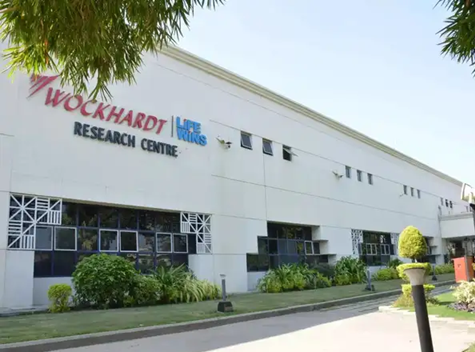预约演示
更新于:2025-09-09

Wockhardt Ltd.
更新于:2025-09-09
概览
标签
感染
泌尿生殖系统疾病
呼吸系统疾病
小分子化药
生物类似药
激素
疾病领域得分
一眼洞穿机构专注的疾病领域
暂无数据
技术平台
公司药物应用最多的技术
暂无数据
靶点
公司最常开发的靶点
暂无数据
| 排名前五的药物类型 | 数量 |
|---|---|
| 小分子化药 | 15 |
| 生物类似药 | 3 |
| 激素 | 2 |
| 集落刺激因子 | 1 |
关联
18
项与 Wockhardt Ltd. 相关的药物作用机制 Bacterial DNA gyrase 抑制剂 [+1] |
在研机构 |
原研机构 |
在研适应症 |
最高研发阶段批准上市 |
首次获批国家/地区 印度 |
首次获批日期2020-01-16 |
作用机制 Bacterial DNA gyrase 抑制剂 |
在研机构 |
原研机构 |
在研适应症 |
最高研发阶段批准上市 |
首次获批国家/地区 印度 |
首次获批日期2019-12-13 |
121
项与 Wockhardt Ltd. 相关的临床试验CTRI/2024/09/073689
A prospective Prescription Event Monitoring (PEM) surveillance to study the safety and efficacy of Emrok (Levonadifloxacin injection) and or Emrok O (Levonadifloxacin Tablet). - Nil
开始日期2026-09-01 |
申办/合作机构 |
NCT06806995
A Single-center, Open-label, Study Evaluating Safety and Pharmacokinetics of Single Doses of Zidebactam-Cefepime and Metronidazole Alone or in Combination Utilizing a 3-Period, Crossover Study Design
This is a Phase I, Single-Center, Open-Label study evaluating the safety and pharmacokinetics of single doses of ZID-FEP and metronidazole alone or in combination utilizing a 3-period, crossover study design. Thirty eligible male and female healthy adult subjects will participate in the study and receive single doses of (1) ZID-FEP 3g IV (ZID 1 g plus FEP 2 g) administered over 1 hour (h); (2) metronidazole 0.5 g IV alone administered over 1 h; and (3) metronidazole 0.5 g IV over 1 h, followed by ZID-FEP 3g IV over 1 h over 3 treatment periods separated by a 48 h washout period.
开始日期2025-01-21 |
申办/合作机构 |
CTR20233796
一项在中国健康受试者中评价FEP-ZID的药代动力学、安全性和耐受性的随机、双盲、安慰剂对照、单次给药I期研究
本研究的主要目的是: 在中国健康受试者中评价3 g头孢吡肟-zidebactam(FEP-ZID)单次静脉注射(IV)给药的药代动力学(PK)。 本研究的次要目的是: 在中国健康受试者中评价3 g FEP-ZID单次IV给药的安全性和耐受性。
开始日期2024-05-10 |
申办/合作机构  Wockhardt Bio AG Wockhardt Bio AG [+2] |
100 项与 Wockhardt Ltd. 相关的临床结果
登录后查看更多信息
0 项与 Wockhardt Ltd. 相关的专利(医药)
登录后查看更多信息
146
项与 Wockhardt Ltd. 相关的文献(医药)2025-07-07·Indian Journal of Critical Care Medicine
Addressing ICU-acquired Weakness: A Call for Early Diagnosis and Intervention
作者: Chanchalani, Gunjan
2025-07-01·Indian Journal of Orthopaedics
Assessing Sexual and Functional Outcomes After Direct Anterior Approach Total Hip Arthroplasty: Insights from a Retrospective Study
Article
作者: Aneja, Kunal ; Rudraraju, Ravi Teja ; Machaiah, Ponnanna Karineravanda ; Bajwa, Supreet ; Dawre, Nitin
Purpose of the Study:
The direct anterior approach (DAA) is favored for its muscle-sparing benefits and rapid recovery after total hip arthroplasty (THA). While functional outcomes are well-documented, the impact of DAA THA on sexual health remains underexplored. This study evaluates the resumption of sexual activity and functional recovery in male patients following DAA THA.
Methods:
A retrospective review of male patients who underwent DAA THA (January 2023 and December 2023) was assessed pre- and post-operatively (2 weeks, 12 weeks, and 1-year) for sexual function using the Sexual Health Inventory for Men (SHIM) and hip functionality through the Harris Hip Score (HHS). Statistical significance was set at p < 0.05.
Results:
Among 64 patients (mean age: 31.4 ± 4.9 years), 73.5% resumed sexual activity within 2 weeks, rising to 95% by 12 weeks. Of those sexually active within 2 weeks, 93% reported a SHIM score of ≥ 20. By 1 year, all patients resumed sexual activity with a mean SHIM score of 23.5. Functional recovery showed a significant improvement in HHS from 39.3 ± 1.4 pre-operatively to 98.9 ± 0.9 at 1 year (p < 0.05). Minor complications, including superficial wound dehiscence (n = 2), were conservatively managed, with no dislocations or major complications reported.
Conclusion:
DAA THA improves hip function and early resumption to sexual activity, an essential yet overlooked aspect in younger male patients. With 95% resuming sexual activity within 12 weeks and full functional restoration by 1 year, DAA THA proves as a safe and effective approach, making it an ideal choice for active, young individuals seeking physical and personal well-being after surgery.
2025-02-01·The Journal of the Association of Physicians of India
Vonoprazan in Management of Refractory Gastroesophageal Reflux Disease: An Indian Expert Group Consensus Statements
Article
作者: Shandil, Rajeev ; Kumar, Manoj ; Garg, Pallavi ; Lamba, G S ; Saha, Indraneel ; Borse, Nitin ; Choudhuri, Gouradas ; Panigrahi, S C ; Sahu, Vikram ; Murthy, K Vamsi ; Kochhar, Rakesh ; Singh, Rajdeep ; Nath, Preetam ; Khanna, Molina ; Jain, Lokesh ; Swami, Onkar C ; Khanna, Sudeep ; Patil, Dinesh ; Shah, Apurva ; Abraham, Philip ; Bandyopadhyay, Sanjay ; Jaiswal, Saurabh ; Kumar, Vinod ; Jain, Monika ; Garg, Ramesh ; Mishra, Ajay ; Bodas, Shripad ; Vaghasia, Smit ; Kantharia, Chetan ; Shah, Hardik ; Poddar, Prateik ; Deshmukh, Sharad ; Kak, Manish ; Chakravarty, Suneel ; Vazifdar, Khurshid ; Tiwaskar, Mangesh ; Sinha, S K ; Sahu, Manoj
BACKGROUND:
Approximately, 40% of gastroesophageal reflux disease (GERD) patients experience insufficient symptom relief from proton-pump inhibitors (PPI), resulting in PPI-refractory GERD (rGERD).
OBJECTIVE:
To review the existing literature and develop an Indian expert group consensus statement on the place of vonoprazan in the management of rGERD.
MATERIALS AND METHODS:
A panel of 35 leading Indian gastroenterologists extensively reviewed the literature to develop consensus statements for the management of rGERD in Indian patients, with a focus on the newly available potassium-competitive acid blocker (P-CAB), vonoprazan. This process involved two structured meetings in which experts deliberated on literature reviews and draft statements, which were further rigorously discussed and modified. Consensus was achieved through a voting process employing a five-point Likert scale, with results meticulously documented. The final statements unanimously approved by all participants and subsequently developed into a comprehensive manuscript.
RESULTS:
Based on the evidence, 14 statements were developed and confirmed by expert panelists for the assessment and management of rGERD. Among these 14 statements, 5 obtained Level A evidence, 4 received Level B, 4 were classified as Level C, and 1 as Level D. The consensus highlights the importance of symptom assessment, lifestyle modifications, and medication adherence, followed by a diagnostic procedure with upper gastrointestinal (GI) endoscopy. If needed, manometry or 24-hour pH impedance may be considered. Vonoprazan, a novel and reversible potassium-competitive acid blocker (P-CAB), has emerged as a potential alternative to proton pump inhibitors (PPIs), offering rapid, potent, and sustained acid suppression. Based on current evidence, a daily dose of 20 mg vonoprazan for 4-8 weeks is recommended as an initial treatment strategy for rGERD.
CONCLUSION:
The consensus endorses the use of vonoprazan to improve patient outcomes and quality of life, highlighting its important place in therapy for controlling rGERD in Indian patients.
59
项与 Wockhardt Ltd. 相关的新闻(医药)2025-08-09
New Delhi:
Pharmaceuticals
firm
Wockhardt Ltd
on Friday reported a widening of
consolidated loss after tax
at Rs 108 crore in the June quarter, hit by impairment due to
liquidation of subsidiaries
in the US after exiting the generics business in the country.
The company had posted a consolidated loss after tax of Rs 16 crore in the corresponding quarter last fiscal, Wockhardt Ltd said in a regulatory filing.
Consolidated
revenue from operations
in the quarter was marginally down at Rs 738 crore against Rs 739 crore in the year-ago period, it added.
Total expenses in the quarter under review were lower at Rs 770 crore compared to Rs 775 crore in the same period a year ago, the company said.
Wockhardt said its management has assessed impairment at CGU (cash generating unit) level, and the related goodwill in the books of account of Rs 97 crore has been impaired as on June 30, 2025, which has been disclosed under exceptional items.
It follows the company's decision to exit the US generic pharmaceutical segment and subsequent filing for voluntary liquidation of step-down subsidiaries, Morton Grove Pharmaceuticals Inc. and Wockhardt USA LLC, both incorporated in Delaware, the filing said.

并购财报生物类似药
2025-08-09
New Delhi:
Pharmaceuticals
firm
Wockhardt Ltd
on Friday reported a widening of
consolidated loss after tax
at Rs 108 crore in the June quarter, hit by impairment due to
liquidation of subsidiaries
in the US after exiting the generics business in the country.
The company had posted a consolidated loss after tax of Rs 16 crore in the corresponding quarter last fiscal, Wockhardt Ltd said in a regulatory filing.
Consolidated
revenue from operations
in the quarter was marginally down at Rs 738 crore against Rs 739 crore in the year-ago period, it added.
Total expenses in the quarter under review were lower at Rs 770 crore compared to Rs 775 crore in the same period a year ago, the company said.
Wockhardt said its management has assessed impairment at CGU (cash generating unit) level, and the related goodwill in the books of account of Rs 97 crore has been impaired as on June 30, 2025, which has been disclosed under exceptional items.
It follows the company's decision to exit the US generic pharmaceutical segment and subsequent filing for voluntary liquidation of step-down subsidiaries, Morton Grove Pharmaceuticals Inc. and Wockhardt USA LLC, both incorporated in Delaware, the filing said.

并购财报生物类似药
2025-07-12
Mumbai: Undertaking a major strategic realignment exercise, Mumbai-based drugmaker
Wockhardt
has announced to exit the
US generics
segment amid mounting losses and will sharpen focus on its innovative portfolio of
antibiotics
and Insulins.
In an intimation to the stock exchange the company said that, “In line with its long-term vision to build a differentiated, innovation-driven enterprise, the company has taken the decision to exit the US generic pharmaceutical segment, to put a deeper focus and investment in its advanced product portfolio.”
"The company has filed for
voluntary liquidation
under Chapter 7 of the US Bankruptcy Code for its step down subsidiaries—Morton Grove
Pharmaceuticals
Inc. and Wockhardt USA LLC—and the decision is effective from 11 July 2025, " it added.
Through this realignment, the company aims to concentrate its investments and resources on its "antibiotics and biologicals portfolio in Insulin."
Wockhardt’s US generics business has been incurring losses for several years, most recently in FY2025 it recorded a loss of around $8 million.
According to the drugmaker the decision has been taken based on a comprehensive strategic review, which concluded that continuing in this segment would detract from its broader innovation agenda.
“By stepping away from the commoditized generics space, in the US, Wockhardt is positioning itself to create long-term value and sustainable profitability," the company said.
“Menawhle the company remains committed to its pharmaceutical operations in India, the UK, Ireland, and other geographies where its businesses continue to deliver strong performance, it added.
By
Online Bureau
,

并购生物类似药
100 项与 Wockhardt Ltd. 相关的药物交易
登录后查看更多信息
100 项与 Wockhardt Ltd. 相关的转化医学
登录后查看更多信息
组织架构
使用我们的机构树数据加速您的研究。
登录
或

管线布局
2025年11月01日管线快照
管线布局中药物为当前组织机构及其子机构作为药物机构进行统计,早期临床1期并入临床1期,临床1/2期并入临床2期,临床2/3期并入临床3期
临床前
5
2
临床1期
临床3期
1
1
申请上市
批准上市
9
14
其他
登录后查看更多信息
当前项目
| 药物(靶点) | 适应症 | 全球最高研发状态 |
|---|---|---|
地塞米松磷酸钠 ( GR ) | 前房炎症 更多 | 批准上市 |
甘精胰岛素生物类似药(Wockhardt Bio AG) ( INSR ) | 1型糖尿病 更多 | 批准上市 |
磷酸可待因 ( Opioid receptors ) | 咳嗽 更多 | 批准上市 |
普瑞巴林 ( CACNA2D1 x CACNA2D2 ) | 神经痛 更多 | 批准上市 |
马来酸依那普利 ( ACE ) | 东部马脑脊髓炎 更多 | 批准上市 |
登录后查看更多信息
药物交易
使用我们的药物交易数据加速您的研究。
登录
或

转化医学
使用我们的转化医学数据加速您的研究。
登录
或

营收
使用 Synapse 探索超过 36 万个组织的财务状况。
登录
或

科研基金(NIH)
访问超过 200 万项资助和基金信息,以提升您的研究之旅。
登录
或

投资
深入了解从初创企业到成熟企业的最新公司投资动态。
登录
或

融资
发掘融资趋势以验证和推进您的投资机会。
登录
或

生物医药百科问答
全新生物医药AI Agent 覆盖科研全链路,让突破性发现快人一步
立即开始免费试用!
智慧芽新药情报库是智慧芽专为生命科学人士构建的基于AI的创新药情报平台,助您全方位提升您的研发与决策效率。
立即开始数据试用!
智慧芽新药库数据也通过智慧芽数据服务平台,以API或者数据包形式对外开放,助您更加充分利用智慧芽新药情报信息。
生物序列数据库
生物药研发创新
免费使用
化学结构数据库
小分子化药研发创新
免费使用
